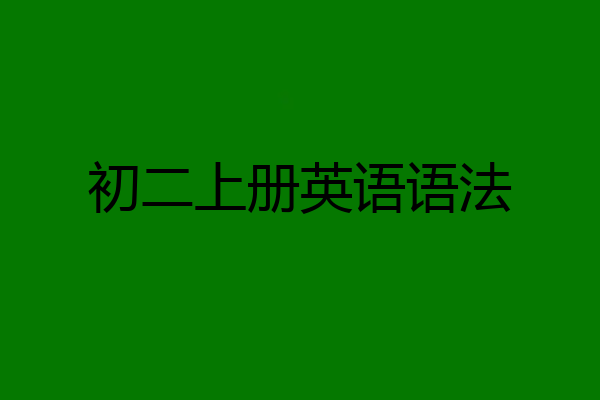
缌喵喵喵
人们很难接受与已有知识和 经验 相左的信息或观念,因为一个人已有的知识和观念都是经过反复筛选的。接下来我给大家分享关于 八年级 英语上册语法知识,希望对大家有所帮助!
八年级英语上册语法知识1
1. 形容词/副词的比较级和最高级的构成规则
(1)单音节词和少数以-er,-ow结尾的双音节单词,比较级在后面加-er,最高级在后面加-est。
① 单音节单词
small→smaller→smallest
short→shorter→shortest
tall→taller→tallest
great→greater→greatest
② 少数以-er,-ow结尾的双音节单词
clever→cleverer→cleverest
narrow→narrower→narrowest
(2)以不发音e结尾的单音节单词,比较级在原形后加-r,最高级在原级后加-st。
large→larger→largest
nice→nicer→nicest
able→abler→ablest
(3)以一个辅音字母结尾的闭音节(即:辅音+元音+辅音)单词中,先双写末尾的辅音字母,比较级加-er,最高级加-est。
big→bigger→biggest
hot→hotter→hottest
fat→fatter→fattest
(4)以“辅音字母+y”结尾的双音节词, 把y改为i,比较级加-er,最高级加-est。
easy→easier→easiest
heavy→heavier→heaviest
busy→busier→busiest
happy→happier→happiest
(5)其他双音节词和多音节词,比较级在前面加more,最高级在前面加most。
beautiful→more beautiful→most beautiful
different→more different→most different
easily→more easily→most easily
(6)有少数形容词、副词的比较级和最高级是不规则的,必须熟记。
good→better→best
well→better→best
bad→worse→worst
ill→worse→worst
old→older/elder→oldest/eldest
many/much→more→most
little→less→least
far →further/farther→ furthest/farthest
2. 形容词和副词比较级的用法
(1)“甲+be+(倍数)+形容词比较级+than+乙”表示“甲比乙…”或“甲比乙…几倍”。
Tom is taller than Kate.
汤姆比凯特高。
This room is three times bigger than that one.
这个房间比那个大三倍。
(2)“甲+实意动词+(倍数)+副词比较级+than+乙”表示“甲比乙…”或“甲比乙…几倍”。
I got up earlier than my mother this morning.
我今天早晨起床比我妈妈还早。
He runs three times faster than his brother.
他跑的速度比他弟弟快三倍。
3. 形容词和副词最高级的用法
(1)“主语+be+the+形容词最高级(+单数名词)+in/of...”表示“……是……中最……的”。
Tom is the tallest in his class./of all the students.
汤姆是他们班上/所有学生当中最高的。
This apple is the biggest of the five.
这个苹果是五个当中最大的。
(2)“主语+实意动词+(the)+副词最高级+in/of...”表示“……是……中最……的”。
I jump (the) farthest in my class.
我是我们班跳得最远的。
八年级英语上册语法知识2
1.主语: 句子 所陈述的对象。
2.谓语:主语发出的动作。一般是有动作意义的动词。
3. 宾语:分为动词宾语和介词宾语,属于动作的承受者。
4. 系动词:表示状态或状态变化的动词,没有实际的动作意义。如 be, 感官系动词(look, sound, smell, taste 和 feel)、保持类系动词(keep, stay 和 remain)、状态变化类系动词(become、get、turn 和 go)等。
5. 表语:紧跟系动词后面的成分。
6. 定语:修饰名词或代词的成分。
7. 状语: 修饰形容词、副词、动词或句子的成分。
8. 补语:分为宾语补足语和主语补足语。是对宾语和主语的补充说明,与其有主动或被动的逻辑关系。
例如:You should keep the room clean and tidy.
你应该让屋子保持干净整洁。
(You是主语, should keep是谓语,the room是宾语,clean and tidy是宾语补足语。)
This kind of food tastes delicious.
这种食物吃起来很可口。
(This kind of food是主语, tastes是系动词, delicious是表语。)
注意:主语、谓语、宾语、系动词、表语、补语是一个句子的主干成分;定语和状语是一个句子的修饰性成分,不是主干成分。
八年级英语上册语法知识3
1.“主语 + 谓语”(即“主谓”句型)
例:They arrived in Harbin yesterday morning.
分析:“they”(主语)“arrived”(谓语)。
2.“主语 + 谓语 + 宾语”(即“主谓宾”句型)
例:I study English.
分析:“I”(主语)“study”(谓语动作)“English”(宾语即动作涉及的对象)。
3.“主语 + 谓语 + 间接宾语 + 直接宾语”(即“主谓双宾”句型)
例:Our teacher taught us English.
分析:“our teacher”(主语)“教”(谓语动作)“us”(间接宾语)“English”(直接宾语)。
4.“主语 + 谓语 + 宾语 + 宾语补足语”(即“主谓宾宾补”句型)
例: He asked her to go there.
分析:“he”(主语)“asked”(谓语动作)“her”(宾语即动作涉及的对象)“to go there”(补语—补充说明宾语做什么)。
5.“主语 + 系动词+ 表语”(即“主系表”句型)
常用的系动词有be, keep,lie, remain, stand, become, fall, get, go, grow, turn, look, feel, seem, smell, sound, taste, 等。
例: I am a teacher. 我是一名老师
分析:“I”(主语)“am”(系动词)“a teacher”(表语—即表明主语的身份)。
八年级英语上册语法知识点相关 文章 :
★ 八年级上册英语语法整理
★ 八年级英语语法知识点归纳总结
★ 初二英语语法知识点汇总
★ 八年级英语上册知识点归纳
★ 八年级英语上册知识点归纳小结
★ 八年级英语语法知识点
★ 最新人教版八年级上册英语知识点
★ 初中八年级英语语法知识点整理
★ 八年级上册英语知识点


huayingxiong6
知识是一切力量的源泉,是文人骚客抒发豪情壮志的资本;是国家兴旺发达,科学发展的力量源泉;是人们独立于世界 文化 之林的基石,下面我给大家分享一些 八年级 上册英语语法知识,希望能够帮助大家,欢迎阅读!
八年级上册英语语法知识1
形容词/副词的比较级和最高级
1. 形容词/副词的比较级和最高级的构成规则
(1)单音节词和少数以-er,-ow结尾的双音节单词,比较级在后面加-er,最高级在后面加-est。
① 单音节单词
small→smaller→smallest
short→shorter→shortest
tall→taller→tallest
great→greater→greatest
② 少数以-er,-ow结尾的双音节单词
clever→cleverer→cleverest
narrow→narrower→narrowest
(2)以不发音e结尾的单音节单词,比较级在原形后加-r,最高级在原级后加-st。
large→larger→largest
nice→nicer→nicest
able→abler→ablest
(3)以一个辅音字母结尾的闭音节(即:辅音+元音+辅音)单词中,先双写末尾的辅音字母,比较级加-er,最高级加-est。
big→bigger→biggest
hot→hotter→hottest
fat→fatter→fattest
(4)以“辅音字母+y”结尾的双音节词, 把y改为i,比较级加-er,最高级加-est。
easy→easier→easiest
heavy→heavier→heaviest
busy→busier→busiest
happy→happier→happiest
(5)其他双音节词和多音节词,比较级在前面加more,最高级在前面加most。
beautiful→more beautiful→most beautiful
different→more different→most different
easily→more easily→most easily
(6)有少数形容词、副词的比较级和最高级是不规则的,必须熟记。
good→better→best
well→better→best
bad→worse→worst
ill→worse→worst
old→older/elder→oldest/eldest
many/much→more→most
little→less→least
far →further/farther→ furthest/farthest
2. 形容词和副词比较级的用法
(1)“甲+be+(倍数)+形容词比较级+than+乙”表示“甲比乙…”或“甲比乙…几倍”。
Tom is taller than Kate.
汤姆比凯特高。
This room is three times bigger than that one.
这个房间比那个大三倍。
(2)“甲+实意动词+(倍数)+副词比较级+than+乙”表示“甲比乙…”或“甲比乙…几倍”。
I got up earlier than my mother this morning.
我今天早晨起床比我妈妈还早。
He runs three times faster than his brother.
他跑的速度比他弟弟快三倍。
3. 形容词和副词最高级的用法
(1)“主语+be+the+形容词最高级(+单数名词)+in/of...”表示“……是……中最……的”。
Tom is the tallest in his class./of all the students.
汤姆是他们班上/所有学生当中最高的。
This apple is the biggest of the five.
这个苹果是五个当中最大的。
(2)“主语+实意动词+(the)+副词最高级+in/of...”表示“……是……中最……的”。
I jump (the) farthest in my class.
我是我们班跳得最远的。
八年级上册英语语法知识2
句子 成分
1.主语:句子所陈述的对象。
2.谓语:主语发出的动作。一般是有动作意义的动词。
3. 宾语:分为动词宾语和介词宾语,属于动作的承受者。
4. 系动词:表示状态或状态变化的动词,没有实际的动作意义。如 be, 感官系动词(look, sound, smell, taste 和 feel)、保持类系动词(keep, stay 和 remain)、状态变化类系动词(become、get、turn 和 go)等。
5. 表语:紧跟系动词后面的成分。
6. 定语:修饰名词或代词的成分。
7. 状语:修饰形容词、副词、动词或句子的成分。
8. 补语:分为宾语补足语和主语补足语。是对宾语和主语的补充说明,与其有主动或被动的逻辑关系。
例如:You should keep the room clean and tidy.
你应该让屋子保持干净整洁。
(You是主语, should keep是谓语,the room是宾语,clean and tidy是宾语补足语。)
This kind of food tastes delicious.
这种食物吃起来很可口。
(This kind of food是主语, tastes是系动词, delicious是表语。)
注意:主语、谓语、宾语、系动词、表语、补语是一个句子的主干成分;定语和状语是一个句子的修饰性成分,不是主干成分。
八年级上册英语语法知识3
简单句的五种基本句型
1.“主语 + 谓语”(即“主谓”句型)
例:They arrived in Harbin yesterday morning.
分析:“they”(主语)“arrived”(谓语)。
2.“主语 + 谓语 + 宾语”(即“主谓宾”句型)
例:I study English.
分析:“I”(主语)“study”(谓语动作)“English”(宾语即动作涉及的对象)。
3.“主语 + 谓语 + 间接宾语 + 直接宾语”(即“主谓双宾”句型)
例:Our teacher taught us English.
分析:“our teacher”(主语)“教”(谓语动作)“us”(间接宾语)“English”(直接宾语)。
4.“主语 + 谓语 + 宾语 + 宾语补足语”(即“主谓宾宾补”句型)
例:He asked her to go there.
分析:“he”(主语)“asked”(谓语动作)“her”(宾语即动作涉及的对象)“to go there”(补语—补充说明宾语做什么)。
5.“主语 + 系动词+ 表语”(即“主系表”句型)
常用的系动词有be, keep,lie, remain, stand, become, fall, get, go, grow, turn, look, feel, seem, smell, sound, taste, 等。
例:I am a teacher. 我是一名老师
分析:“I”(主语)“am”(系动词)“a teacher”(表语—即表明主语的身份)。
八年级上册英语语法知识4
宾语从句
1. 宾语从句的含义
在主句中做宾语的从句叫做宾语从句。
如:She knew that the teacher had seen the film.
她知道这位老师看过这部电影。
“that the teacher had seen the film”做 knew 的宾语,同时又是由连接词 that 引导的从句,所以它叫做宾语从句。
2. 宾语从句的分类
(1)动词宾语从句:顾名思义,它是位于动词后面的宾语从句。
如:He asked whose handwriting was the best in our class.他问我们班上谁的书法最好。
(2)介词宾语从句:顾名思义,它是位于介词后面的宾语从句。
如:I agree with what you said just now.我同意你刚才说的话。
(3)形容词宾语从句:顾名思义,它是位于形容词后面的宾语从句。
如:I am afraid that I will be late. 恐怕我要迟到了。
3. 引导名词性从句的连接词
(1)that:没有含义,在宾语从句中不做成分
(2)whether/if:表示是否,在宾语从句中不做成分。
I don't know if /whether he still lives here after so many years. 我不知道这么多年后,他是否还住在这里。
(3)连接代词:what, which, who, whom, whose(在宾语从句中做主、宾、表和定语)
连接副词:where, when, how, why(在宾语从句中做状语)
The small children don't know what is in their stockings.(what 在宾语从句中做主语)
这些小孩子不知道什么在他们的长筒袜里。
Could you tell me why you were late for the meeting this morning?(why 在宾语从句中做原因状语)
你能告诉我为什么你今天早上开会迟到吗?
4. 在做宾语从句的题目时应注意两点
(1)时态:
①当主句是现在时态时,宾语从句可以根据需要使用任何时态。
I don't know when he will come back.我不知道他将何时回来。
He tells me that his sister came back yesterday.他告诉我他姐姐昨天回来了。
②当主句是过去时态时,宾语从句必须是一种过去的时态。
She asked me if I knew whose pen it was.她问我是否知道这是谁的钢笔。
He said that he could finish his work before supper.他说他会在晚饭前完成工作。
③当表示客观事实或普遍真理的句子做宾语从句时,任何时候都用一般现在时。
The teacher said that the earth goes round the sun.老师说过地球绕着太阳转。
(2)语序:任何从句都使用陈述句语序,宾语从句当然也不例外。
八年级上册英语语法知识5
现在进行时
现在进行时表示此时此刻正在发生的事情。常与now,at the moment,look,listen等词连用。
The little boy is watching TV now.
这个小男孩现在正在看电视。
Listen!She is playing the guitar in the next room.
听!她正在隔壁房间弹吉他。
现在进行时的基本结构:
肯定式:am/is/are+doing(现在分词)
否定式:am/is/are not +doing(现在分词)
一般疑问式:Am/Is/Are + 主语 +doing(现在分词)+ 其他
特殊疑问式:特殊疑问词+一般疑问式
They’re having a meeting now.
他们现在正在开会。
They aren't having a meeting now.
他们现在没有在开会。
Are they having a meeting now?
他们现在正在开会吗?
What are they doing now?
他们现在正在做什么?
八年级上册英语语法知识点相关 文章 :
★ 八年级上册英语语法整理
★ 八年级上册英语语法知识点复习
★ 初中八年级英语语法知识点整理
★ 初二英语语法知识大全:易错词汇归纳
★ 八年级英语语法知识点归纳总结
★ 初二英语语法知识点汇总
★ 8上英语语法知识
★ 八年级上册英语语法复习资料
★ 八年级上册英语Units1-10单元知识点归纳
★ 八年级英语语法汇总

伪文艺的姑娘
一. 宾语从句的种类宾语从句是一种名词性从句,在句中作及物动词的宾语,或介词的宾语,或形容词的宾语。根据引导宾语从句的不同连词,宾语从句可分为三类。1. 由that引导的宾语从句。That只有语法作用,没有实在的意义,在口语和非正式文体中可以省略。例如:He said (that) he wanted to stay at home.2. 由连接代词who, whom, whose, what, which和连接副词when, where, why, how引导的宾语从句。这些连接代词和连接副词在宾语从句中充当某个成分。例如:Do you know who (whom) they are waiting foe?3. 由if或whether引导的宾语从句。If和whether在句中的意思是“是否”。例如:I want to know if (whether) he lives there.He asked me whether (if) I could help him.二. 宾语从句的语序宾语从句的语序应为陈述句的语序。例如:I hear (that) physics isn’t easy.三. 宾语从句的时态1. 如果主句的时态是一般现在时,宾语从句该用什么时态就用什么时态。I don’t think (that) you are right.2. 如果主句的时态是一般过去时,宾语从句只能用相应的过去时态(一般过去时, 过去进行时, 过去将来时,过去完成时)He asked what time it was.3. 如果宾从陈述的是客观真理,时态常用一般现在时Our teacher said that January is the first month of the year.Scientists have proved that the earth turns around the sun.语法定义:在复合句中用作宾语的从句叫宾语从句。I.语序的使用 分为以下五种句型结构:1)连接词+谓语。连接词在从句中作主语。常见的连接词有: who,what,which等。如:Excuse me,could you tell me which is the way to restrooms,please?劳驾能告诉我去洗手间的路是哪一条?He doesn't know who lives over there .他不知道谁住那边2)连接词+名词+谓语。连接词在从句中作主语的定语。常见的连接词有:whose,what,which,how many,how much等。如:He asked whose bag this was .他问这是谁的书包。I wonder how much water there is in the glass.我想知道杯里有多少水3)连接词+主语+谓语。连接词在从句中作宾语、状语或表语。常见的连接词有:who(m),what,which,how many,how much, when,why,how,where,if(一般用于口语) /whether(与同音词weather;“天气”的拼写区别,写在句中不充当任何成分)等。如:He couldn’t decide if he would buy them.他不能决定是否将买他们。Could you tell me how I should come up with the problem ?你能告诉我我该怎样解决这个问题?4)连接词+名词+主语+谓语。连接词在从句中作宾语或表语的定语。常见的连接词有:what,which,how many,how much,how等。如:I don’t know how many books he has?我不知道他有多少本书?He didn’t understand which book I was looking for.他不明白我在找哪一本书。5) 连接词+动词不定式(to+V 动词原形)+... 连接词可以是关系代词和关系副词,what, whose. Which,how long,whom ,who …etc.Eg:I wonder how to use the computer.我期盼怎样使用电脑
优质英语培训问答知识库